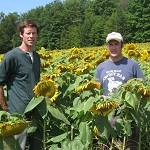11 Mar 2014
Waterbury LEAP Energy Fair
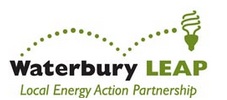 Saturday, April 5, 2014 | From 9am to 3pm | Free Admission
Saturday, April 5, 2014 | From 9am to 3pm | Free Admission
Crossett Brook Middle School Gym, Duxbury
Including the Waterbury Farmers’ Market
Learn how to reduce fuel bills, save energy, and reduce emissions by visiting over 70 exhibitors, participating in break-out discussions, and taking part in walk-through weatherization and energy demonstration projects. Go here for an overview of the event and list of exhibitors.
10 Mar 2014
Montpelier Announces a Renewable Energy Future

A new initiative is focused on making Montpelier, Vermont the first net-zero capital city in the country.
City officials today joined with energy leaders to launch a major initiative focused on making Montpelier the first net zero capital city in the country. Achieving net zero means that Montpelier would meet all its power needs through renewable energy sources and efficiency by 2030. The City of Montpelier was joined by a coalition of organizations that are committed to making this goal a reality.
“This ambitious goal, endorsed by the city council, sets a new direction for Montpelier’s energy future that will provide the opportunity for every citizen to engage,” said Montpelier Mayor John Hollar.
Montpelier is uniquely positioned to move forward on the net zero by 2030 goal. More than 15% of Montpelier housing units have already completed comprehensive energy efficiency projects with Efficiency Vermont; in 2013, the city upgraded all streetlights to high efficiency LEDs; and the downtown biomass district heating project is currently nearing completion.
The Energy Action Network and Montpelier Energy Advisory Committee have worked closely with the city to set the net zero goal and bring together the group of stakeholders to map out a plan of action. “Montpelier’s commitment to creating a secure and affordable energy future is tremendously exciting,” said Andrea Colnes, executive director of the Energy Action Network. “Through this project Montpelier and Vermont will again lead by example and inspire other cities across the US to reach for a bright future and shift to clean, renewable energy.”
Dan Jones, Chair of the Montpelier Energy Advisory Committee, describes this project as “a unique approach for a city as a whole. By engaging the city government, businesses, and citizens around a common vision, we hope to change the conversation from piecemeal small reforms to a system-wide reimagining of our energy priorities. This project will require the collaboration of all Montpelier’s sectors to make it a reality.”
As part of today’s launch, Green Mountain Power and Efficiency Vermont announced a suite of initiatives designed to support the effort by driving down energy consumption and increasing the use of renewable energy in Montpelier. These include:
Green Mountain Power will work with the city to locate multiple electric vehicle charging stations in the City;
- Efficiency Vermont will convene a “Net Zero Montpelier” community conversation in September to help residents, businesses, and local partners set goals and take action on energy efficiency. Reducing energy consumption is a key first step towards net zero, since it enables a larger portion of energy needs to be met through renewable sources;
- Efficiency Vermont experts will offer guidance, incentives, and support to help homeowners reduce their energy usage and make their homes “net zero ready;”
- Green Mountain Power will extend to Montpelier its pilot heat pump program that saves customers money while reducing fossil fuel use for heating;
- Efficiency Vermont and the City of Montpelier will develop an energy road map for all municipal facilities, including exploring the opportunity to design the new downtown transit center to net zero standards, and kicking off a large scale energy saving project at the wastewater treatment facility;
- The Vermont Department of Buildings and General Services will collaborate with Efficiency Vermont on a large scale effort to reduce energy usage in Montpelier’s state buildings;
- GMP will work with AllEarth Renewables to install solar trackers in a group net metering project involving the Vermont Natural Resources Council and Vermont Land Trust, who have expressed interest in taking the power. The trackers will be on GMP property near the entrance of the city and will be a visual statement of Montpelier’s commitment to becoming net zero.
“This initiative signals a transformation in how Vermont’s cities and towns will use energy,” said Mary Powell, president and chief executive officer of Green Mountain Power. “Deploying new technologies in our cities and towns, as we are also doing in Rutland, will have economic and environmental benefits for all Vermonters. It makes perfect sense that Vermont would be the state where we can successfully make our capital net zero.”
“We are looking forward to helping turn the vision of Net Zero Montpelier into a reality,” said Jim Merriam, Director of Efficiency Vermont. “In driving progress toward the net zero goal, Efficiency Vermont experts will engage with partners and community members at every level to help them get the most value for their energy dollars, and set the stage for a clean energy future.”
Other partners in Net Zero Montpelier have so far included: Vermont State Employees Credit Union, National Life, Vermont Energy Investment Corporation, SunCommon, IBM and the general membership of the Energy Action Network. As Net Zero Montpelier continues to engage the community, there will be numerous opportunities for additional organizations and stakeholders become actively involved in the effort.
For more information on Net Zero Montpelier, or to get involved, please visit www.eanvt.org/net-zero-montpelier. To learn more about GMP’s heat pump pilot project, email heatpump@greenmountainpower.com.
Press Contact:
Jessie Baker
Assistant City Manager
City of Montpelier
39 Main Street
Montpelier, VT 05602
(802) 262-6250
17 Sep 2013
North Hardwick Organic Dairy
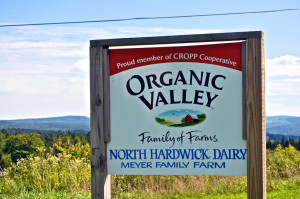 Feedstock: Sunflowers, certified organic
Feedstock: Sunflowers, certified organic
Fuel: Biodiesel
Co-products: High-protein sunflower meal as feed ingredient
Energy Output: Power (for farm machinery)
Services: Oilseed Grower, Oil milling, Fuel Processing, Feed Supply
Owner: Nick and Taylor Meyer
Location: Hardwick, Vermont
The Meyer family has owned and operated their dairy on a 327-acre farm in Hardwick, Vermont since 1978. In 2003, when the younger Meyer boys took over the farm where they grew up, they transitioned to organic production. Today, Nick and Taylor produce some of the highest quality milk in the state of Vermont, winning numerous awards and gaining notoriety for their sustainable and innovative approach.
That approach has included efforts to reduce overhead costs by making the farm as self-sufficient as possible. A Bergy Wind Turbine was erected in 2007 to provide some of the farm’s electricity and Andrew began making biodiesel from waste vegetable oil in 2008. All the tractors on the farm run on B50 (50% biodiesel & 50% petrodiesel) for the summer and the furnace runs on B15 for the winter months.
“I want to produce everything the farm needs, without buying out (off the farm)” Nick Meyer explains. North Hardwick Dairy (NHD) uses 4,000 gallons of diesel each year (2,000 gallons of diesel for off- road equipment and 2,000 gallons in their furnace).
Read More
27 Aug 2013
UVM Crops and Soils 2013 Annual Field Day
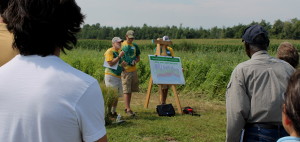 The University of Vermont Extension Northwest Crops and Soils team held their annual Field Day on Thursday, August 1, 2013 from 10:00am to 3:30pm at Borderview Research Farm in Alburgh, Vermont.
The University of Vermont Extension Northwest Crops and Soils team held their annual Field Day on Thursday, August 1, 2013 from 10:00am to 3:30pm at Borderview Research Farm in Alburgh, Vermont.
Dr. Heather Darby led more than 200 attendees on a tour of research stations at the farm. The theme of this year’s field day was “Strategic Farming – Gearing Up for Weather Extremes.” Tour stops included brief overviews fr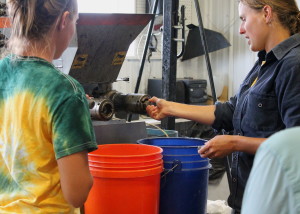 om researchers and technicians focused on cover crops, irrigation systems, sunflowers for cooking oil and biodiesel, wheat varieties, aerial seeding, hops variety trials and demonstration of a mechanized hops harvester, and demonstration of an oilseed press.
om researchers and technicians focused on cover crops, irrigation systems, sunflowers for cooking oil and biodiesel, wheat varieties, aerial seeding, hops variety trials and demonstration of a mechanized hops harvester, and demonstration of an oilseed press.
Vermont Bioenergy Initiative was in attendance with the Bioenergy Now! videos along with copies of the report, Vermont On-Farm Oilseed Enterprises: Production Capacity and Breakeven Economics written by Netaka White, formerly of VSJF and now of Full Sun Company, and Chris Callahan with UVM Extension.
More than 20 attendees, many of them farmers, attended the demonstration of the two oilseed presses at Borderview Farm by Hannah Hardwood of UVM Extension and Roger Rainville, owner along with his wife, Claire, of Borderview Farm.
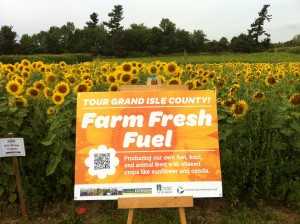
A roadside sign informs passerby of the Farm Fresh Fuel project in Grand Isle County, Vermont. Photo credit: VSJF
A small revolution is happening in Grand Isle County, a declaration of fuel independence: In 2012, ten farmers and landowners tried their hand at growing sunflowers to have the oil made into biodiesel to fuel farm equipment or heat their homes.
Many farmers want to diversify their operation, control and lower fuel costs, and become more self-sufficient. Additionally, locally-grown renewable energy will support the agriculture economy. In Grand Isle County, growing their own biodiesel can save farmers more than $2.00 per gallon, according to a new study released by the Vermont Sustainable Jobs Fund (See the report, Vermont On-Farm Oilseed Enterprises: Production Capacity and Breakeven Economics). Emerging feedstocks and new technology takes know-how, and the Vermont Bioenergy Initiative (VBI) at Vermont Sustainable Jobs Fund is taking steps to overcome barriers to energy self-sufficiency on the farm.
With funding from the U.S. Department of Energy, Borderview Farm staff and UVM Extension researchers guided the planting, tending, and harvesting of more than 60 acres of sunflowers in the 2012 growing season for the Grand Isle Farm Fresh Fuels Project. Each farmer planted two to ten acres of sunflowers, growing more than 30 tons of sunflower seeds. The seeds will be pressed into 3,000 gallons of renewable, low-emission biodiesel and 26 tons of oilseed meal to feed livestock or use as pellet fuel.
For the UVM researchers, coordinating the project, overcoming some of the logistical challenges, and shepherding a successful crop of sunflowers into the storage bin at Roger Rainville’s farm was all part of the job. The lessons learned this year in Grand Isle County also contribute to a growing body of knowledge that is helping farmers in other regions put more acres under oilseed production and save money on their fuel bills.
To learn more about the Farm Fresh Fuel project, visit the UVM website and the Oilseeds section of this website.





